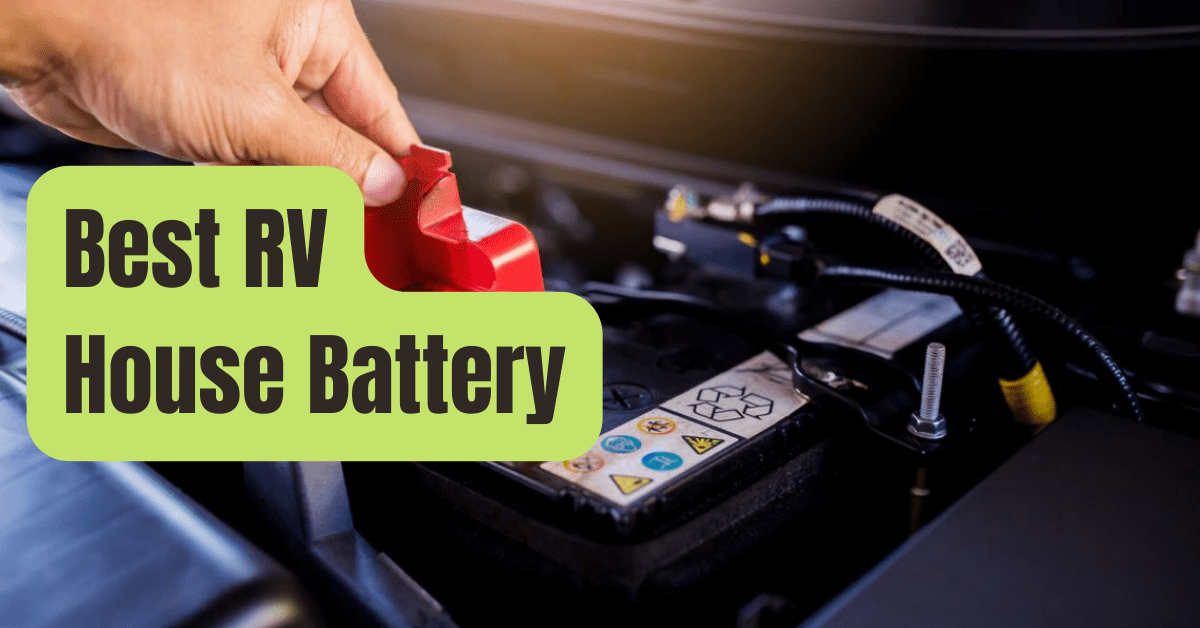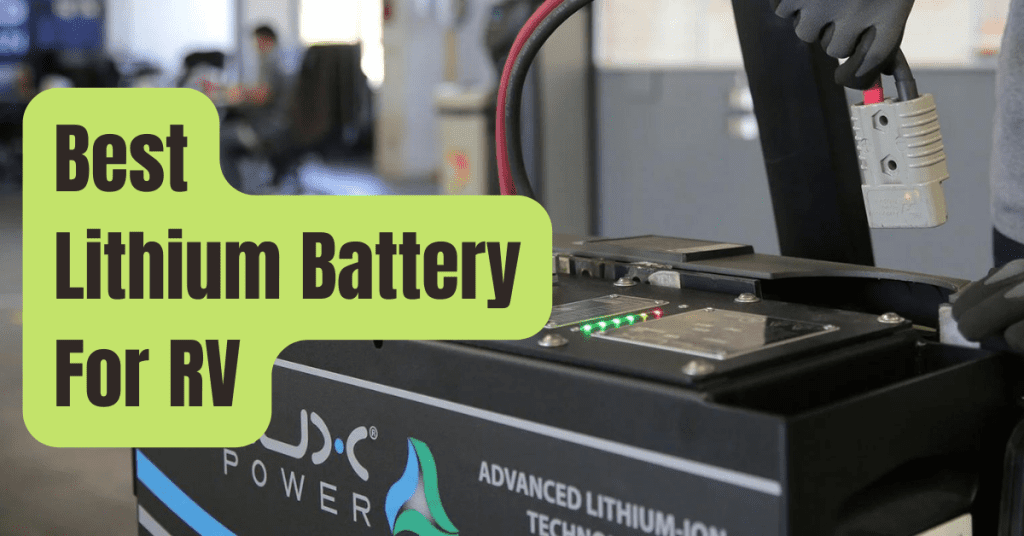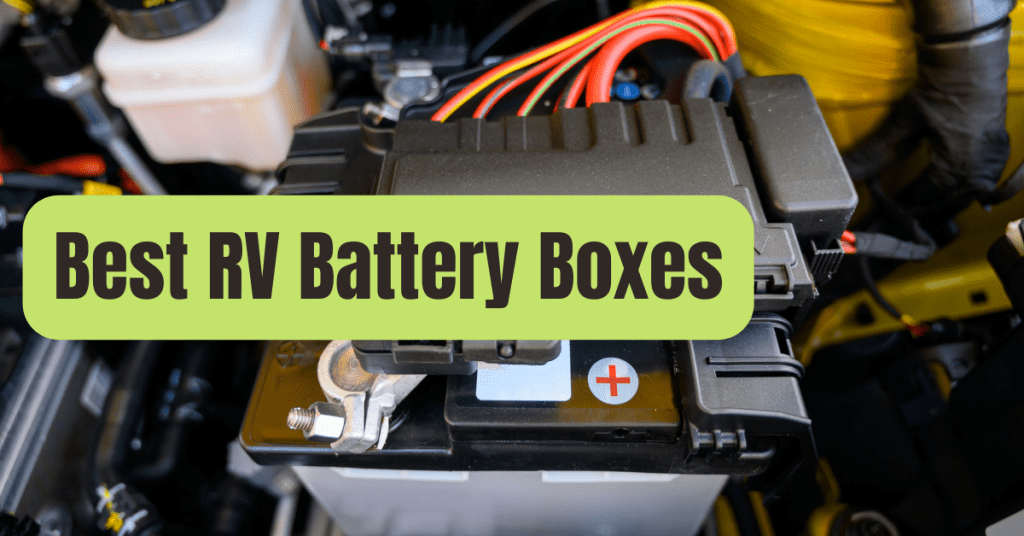If you want your appliances to run after the main engine of your RV has been shut down for the night while you’re traveling with your family, you’ll need to have a strong RV house battery.
But if you’re like the majority of RV owners, you’re still working on understanding how RV electrical systems function.
In this post, we’ll go over what to look for when buying an RV house battery and why choosing wisely will significantly affect how much you enjoy using your RV while traveling.
How to Select a House Battery for an RV
Deep cycle batteries, AGM batteries, lithium batteries, and compact vehicle batteries are the four different kinds of RV batteries.
The benefits and drawbacks of each kind for usage in an RV vary.
Deep cycle batteries will be the best option for the majority of individuals.
Deep cycle batteries may be used in RVs, however there are several versions available.
The three most crucial characteristics of RV house batteries—the maximum discharge rate, the self-discharge rate, and the operating temperature range—must be taken into consideration in order to distinguish between deep cycle batteries and determine which is the best choice for your family’s RV needs.
#1. Maximum Discharge Rate and Capacity
Volts, which are denoted as V in product specifications, are the unit used to measure a battery’s maximum discharge rate.
The unit of measurement for battery capacity is ampere-hours, or simply Ah.
In other words, a battery’s maximum capacity increases with the number of advertised ampere-hours.
The number of appliances you may use simultaneously depends on the battery’s maximum discharge rate, which is crucial.
As a result, a house battery for an RV that advertises a maximum discharge rate of 12V may handle twice as much demand as a 6V battery.
Most RV house batteries increase the battery’s fundamental voltage by up to 10 times so that it can power 120V equipment.
In practice, 6V may be the difference between having to limit the use of several appliances at once and being able to use a toaster oven and an electric kettle simultaneously.
On the other hand, not everyone will need an RV house battery that can power many appliances at once.
You may definitely get by with a lower maximum discharge rate if you want to use your RV only by yourself.
There is never a circumstance when a lesser battery capacity for an RV house battery is beneficial.
#2. Rate of Self-Discharge
The self-discharge rate of a battery, which should not be confused with the maximum discharge rate, measures how quickly a battery uses up its energy while nothing is pulling power.
The chemistry of a battery affects the self-discharge rate of the battery.
Lithium batteries, when used as RV house batteries, have the lowest self-discharge rates and take the longest to completely drain.
Since your RV won’t be using your battery for the great majority of the time, the self-discharge rate is crucial.
When you do need to use the battery to power your appliances, you want the battery to have enough power to do so.
When your RV hasn’t been used for a while, batteries with greater self-discharge rates are more likely to be dead.
Batteries with low self-discharge rates, on the other hand, will consistently have enough charge to run your appliances when you need it.
#3. Range of Operation’s Temperatures
It may seem strange to pay attention to the operating temperature range of your RV house batteries, but it’s an important component to comprehend.
Batteries self-discharge quite quickly when they are heated, but they do so somewhat even when they are not being used to power equipment.
As a result, if you want to leave your RV in the hot summer heat, you should anticipate that an RV house battery with a smaller operational temperature range would self-discharge more quickly.
In some ways, the contrary is also true.
Batteries cannot self-discharge in colder environments, but if they are warmed up too rapidly from freezing conditions, they might suffer hairline cracks in the battery shell.
Finding an RV house battery with an operating temperature range that corresponds to how you will use and store your RV is essential if you own an RV.
You don’t absolutely need an RV battery that is rated to work at low temperatures if you want to leave your RV outside in the bitter cold throughout the winter.
Reviews of RV House Batteries
It’s time to research our top three choices for the best RV house batteries now that you know what to look for when you’re searching for one.
Optimal RV House Battery
#1. Weize 12V 100AH Deep Cycle AGM SLA VRLA Battery
The Weize has a 100 Ah capacity, which is more than sufficient for everyday uses.
The Weize’s output is the same; at 12V, it is enough for at least one large appliance.
When utilizing the Weize battery in the cold, use caution.
Although the battery’s self-discharge protection is certified to survive a typical range of temperatures, it isn’t as robust as you may desire.
Pros:
- Small size
- Simple installation
- Overheating-resisting coating
- Anti-fracture housing for glass
Cons:
- Weak collection of instructions
- A minimal maximum capacity
#2. ML35-12 Gel – 12 Volt 35AH Rechargeable Gel Type Battery
The ML35-12 Gel – 12 Volt 35AH Rechargeable Gel Type Battery is a compact and effective RV house battery that quickly recharges to make up for its modest 35 Ah capacity.
This battery’s capacity is consistent throughout the duration of its rated number of lifetime cycles since it is built using gel technology.
The battery is less resistant to temperature fluctuations as a result of this feature.
Plan properly since the battery suffers more from quick heating after a cold start.
When handling and installing this battery, use caution.
The carrying handles may fracture with repeated tension, causing the battery to fall and possibly sustain harm.
Additionally, you should be aware that this battery does not come standard with any mounting hardware.
Pros:
- Ability to recharge quickly
- Very mobile
- A welcoming aesthetic
- Stable performance throughout time
Cons:
- Small capacity
- Handle fragility
Under Best RV House Battery
#3. Renogy Deep Cycle AGM Battery
With a 100Ah capacity and 12V output, the Renogy Deep Cycle AGM Battery is a strong option for your RV.
The Renogy has a greater working temperature range than typical, in contrast to comparable home RV batteries.
Whether you use the Renogy in the sweltering heat or the bitter cold, its performance won’t be affected.
Its casing won’t either sustain cracks from quick heating from a frozen condition.
The Renogy is a wonderful option for folks who only sometimes drive their RV since it reduces self-discharge to 3% of its full capacity every month of downtime.
If you keep within the Renogy’s limits, it will serve you well even if you shouldn’t take it anywhere below 0 degrees Fahrenheit.
Pros:
- Wide range of operation temperatures
- Low rate of self-discharge
- Durable
- No upkeep necessary
Cons:
- Despite a broad range, not ideal for frigid climates
- Casing is readily scratched.
#4. Universal Power Group 12V 100Ah Solar Wind AGM SLA DEEP Cycle VRLA Battery
Comparatively speaking to many of its rivals, this RV house battery is fairly well-rounded with a regular 100 Ah capacity and a lower-than-average self-discharge rate.
Contrary to conventional batteries that function best when put right-side-up, this battery promotes the fact that it may be mounted in any direction.
While this is true, if the battery is placed in different ways, its performance may degrade over time.
However, this battery can be the best option if your RV only has a mounting slot with a specified orientation.
Pros:
- Minimalistic and light
- No upkeep is essential
- Spill-proof construction
- A year-long warranty
Cons:
- Confused collection of instructions
- Battery performance may be impacted by mounting location.
Optimal RV House Battery
#5. Renogy 12V 200Ah Rechargeable Deep Cycle Pure Gel Battery
Renogy 12V 200Ah Rechargeable Deep Cycle Pure Gel Battery is our pick for the finest RV house battery overall because of its better capacity and low self-discharge over prolonged durations.
The 200Ah Renogy gel battery has a huge capacity and promises to maintain its charge for up to 10 years at ambient temperature.
This battery could be a terrific method to reduce the burden of charging the home batteries for folks who seldom ever use their RV.
You can buy a battery that is rated for the coldest temperatures you’ll ever experience on Earth using a Renogy gel battery.
Its operating temperatures in hot weather are the same.
This implies that the Renogy gel battery is difficult to surpass if you want to travel to remote locations.
Pros:
- 200Ah large capacity
- Outstanding self-discharge prevention
- Excellent for use with solar panel installations for RVs
- Maximum possible working temperatures
Cons:
- Extensive form factor
- RV home batteries that are heavier than usual
#6. Battle Born LiFePO4 Deep Cycle Battery
The Battle Born LiFePO4 Deep Cycle Battery is our second pick for the finest RV house battery overall.
With the Battle Born, you’ll receive close to 5000 cycles throughout the course of the battery, making it one of the best on the market in terms of cycle counts.
Additionally, you’ll obtain a maximum discharge rate that is greater than the house outlet at home and is above average.
The majority of users won’t need to utilize this feature, but if you need to power a variety of devices, the Battle Born won’t let you down.
The Battle Born battery is a great battery, however due to its excessive weight and taller than typical form factor, it isn’t ideal.
Plan appropriately since some batteries, although having a 100 Ah capacity, are smaller, lighter, and more portable.
Pros:
- Extraordinary longevity
- Environmentally responsible building
- Maximum discharge rate above average while supporting several appliances simultaneously
- Over 5000 battery cycles in a lifetime
Cons:
- Measures 31 lbs.
- Greater height than other batteries with comparable capacity
Moving Away
It’s time to choose which battery to utilize with your RV now that you’re informed about our top recommendations for the finest RV house batteries.
Check out the Renogy Gel battery if you want a sizable battery that won’t ever run out of power after a protracted trip away from your RV.
The Weize battery, on the other hand, is definitely a better option if you don’t intend on taking extended vacations from your RV or visiting places with harsh temperatures.
Keep in mind that the temperatures you expose your RV house batteries to will affect how it acts.
Avoid handling your batteries mechanically as this might harm their performance and never undertake maintenance on RV batteries yourself.










